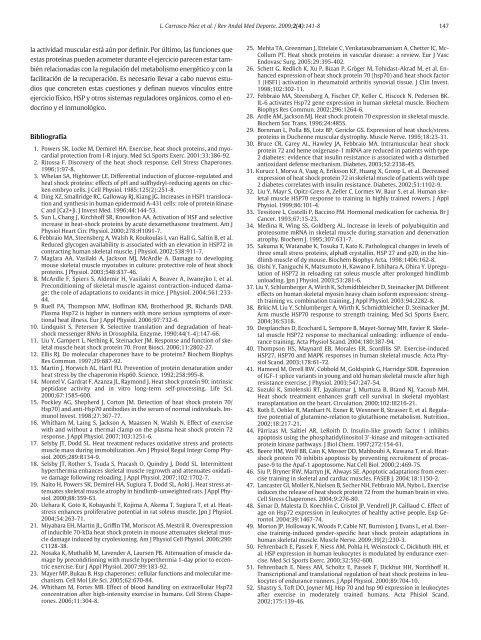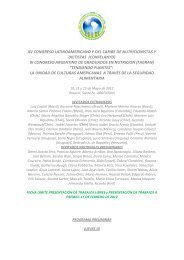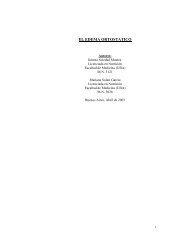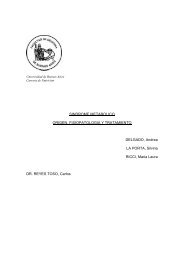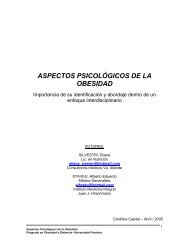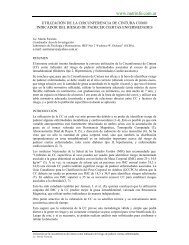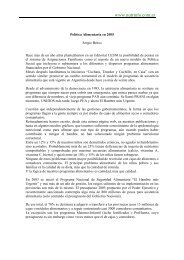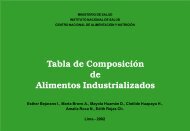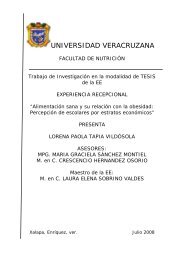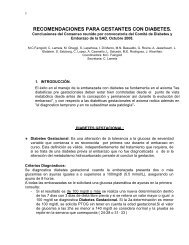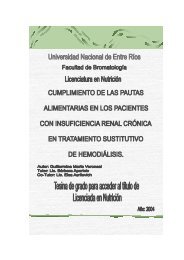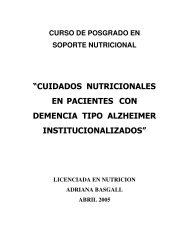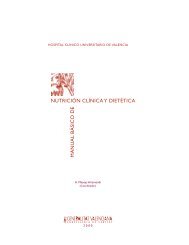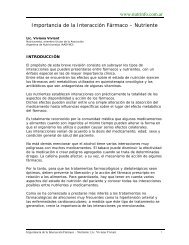Create successful ePaper yourself
Turn your PDF publications into a flip-book with our unique Google optimized e-Paper software.
la actividad muscular está aún por defi nir. Por último, las funciones que<br />
estas proteínas pueden a<strong>com</strong>eter durante el ejercicio parecen estar también<br />
relacionadas con la regulación <strong>del</strong> metabolismo energético y con la<br />
facilitación de la recuperación. Es necesario llevar a cabo nuevos estudios<br />
que concreten estas cuestiones y defi nan nuevos vínculos entre<br />
ejercicio físico, HSP y otros sistemas reguladores orgánicos, <strong>com</strong>o el endocrino<br />
y el inmunológico.<br />
Bibliografía<br />
1. Powers SK, Locke M, Demirel HA. Exercise, heat shock proteins, and myocardial<br />
protection from I-R injury. Med Sci Sports Exerc. 2001;33:386-92.<br />
2. Ritossa F. Discovery of the heat shock response. Cell Stress Chaperones.<br />
1996;1:97-8.<br />
3. Whelan SA, Hightower LE. Differential induction of glucose-regulated and<br />
heat shock proteins: effects of pH and sulfhydryl-reducing agents on chicken<br />
embryo cells. J Cell Physiol. 1985;125(2):251-8.<br />
4. Ding XZ, Smallridge RC, Galloway RJ, Kiang JG. Increases in HSF1 translocation<br />
and synthesis in human epidermoid A-431 cells: role of protein kinase<br />
C and [Ca2+]i. J Invest Med. 1996;44:144-53.<br />
5. Sun L, Chang J, Kirchhoff SR, Knowlton AA. Activation of HSF and selective<br />
increase in heat-shock proteins by acute dexamethasone treatment. Am J<br />
Physiol Heart Circ Physiol. 2000;278:H1091-7.<br />
6. Febbraio MA, Steensberg A, Walsh R, Koukoulas I, van Hall G, Saltin B, et al.<br />
Reduced glycogen availability is associated with an elevation in HSP72 in<br />
contracting human skeletal muscle. J Physiol. 2002;538:911-7.<br />
7. Maglara AA, Vasilaki A, Jackson MJ, McArdle A. Damage to developing<br />
mouse skeletal muscle myotubes in culture: protective role of heat shock<br />
proteins. J Physiol. 2003;548:837-46.<br />
8. McArdle F, Spiers S, Aldemir H, Vasilaki A, Beaver A, Iwanejko I, et al.<br />
Preconditioning of skeletal muscle against contraction-induced damage:<br />
the role of adaptations to oxidants in mice. J Physiol. 2004;561:233-<br />
44.<br />
9. Ruell PA, Thompson MW, Hoffman KM, Brotherhood JR, Richards DAB.<br />
Plasma Hsp72 is higher in runners with more serious symptoms of exertional<br />
heat illness. Eur J Appl Physiol. 2006;97:732-6.<br />
10. Lindquist S, Petersen R. Selective translation and degradation of heatshock<br />
messenger RNAs in Drosophila. Enzyme. 1990;44(1-4):147-66.<br />
11. Liu Y, Gampert L, Nething K, Steinacker JM. Response and function of skeletal<br />
muscle heat shock protein 70. Front Biosci. 2006;11:2802-27.<br />
12. Ellis RJ. Do molecular chaperones have to be proteins? Biochem Biophys<br />
Res Commun. 1997;29:687-92.<br />
13. Martin J, Horwich AL, Hartl FU. Prevention of protein denaturation under<br />
heat stress by the chaperonin Hsp60. Science. 1992;258:995-8.<br />
14. Montel V, Gardrat F, Azanza JL, Raymond J. Heat shock protein 90: intrinsic<br />
peptidase activity and in vitro long-term self-processing. Life Sci.<br />
2000;67:1585-600.<br />
15. Pockley AG, Shepherd J, Corton JM. Detection of heat shock protein 70/<br />
Hsp70) and anti-Hsp70 antibodies in the serum of normal individuals. Immunol<br />
Invest. 1998;27:367-77.<br />
16. Whitham M, Laing S, Jackson A, Maassen N, Walsh N. Effect of exercise<br />
with and without a thermal clamp on the plasma heat shock protein 72<br />
response. J Appl Physiol. 2007;103:1251-6.<br />
17. Selsby JT, Dodd SL. Heat treatment reduces oxidative stress and protects<br />
muscle mass during immobilization. Am J Physiol Regul Integr Comp Physiol.<br />
2005;289:R134-9.<br />
18. Selsby JT, Rother S, Tsuda S, Pracash O, Quindry J, Dodd SL. Intermittent<br />
hyperthermia enhances skeletal muscle regrowth and attenuates oxidative<br />
damage following reloading. J Appl Physiol. 2007;102:1702-7.<br />
19. Naito H, Powers SK, Demirel HA, Sugiura T, Dodd SL, Aoki J. Heat stress attenuates<br />
skeletal muscle atrophy in hindlimb-unweighted rats. J Appl Physiol.<br />
2000;88:359-63.<br />
20. Uehara K, Goto K, Kobayashi T, Kojima A, Akema T, Sugiura T, et al. Heatstress<br />
enhances proliferative potential in rat soleus muscle. Jpn J Physiol.<br />
2004;54:263-71.<br />
21. Miyabara EH, Martin JL, Griffi n TM, Moriscot AS, Mestril R. Overexpression<br />
of inducible 70-kDa heat shock protein in mouse attenuates skeletal muscle<br />
damage induced by cryolesioning. Am J Physiol Cell Physiol. 2006;290:<br />
C1128-38.<br />
22. Nosaka K, Muthalib M, Lavender A, Laursen PB. Attenuation of muscle damage<br />
by preconditioning with muscle hyperthermia 1-day prior to eccentric<br />
exercise. Eur J Appl Physiol. 2007;99:183-92.<br />
23. Mayer MP, Bukau B. Hsp chaperones: cellular functions and molecular mechanism.<br />
Cell Mol Life Sci. 2005;62:670-84.<br />
24. Whitham M, Fortes MB. Effect of blood handling on extracellular Hsp72<br />
concentration after high-intensity exercise in humans. Cell Stress Chaperones.<br />
2006;11:304-8.<br />
L. Carrasco Páez et al. / Rev Andal Med <strong>Deporte</strong>. 2009;2(4):141-8 147<br />
25. Mehta TA, Greenman J, Ettelaie C, Venkatasubramaniam A, Chetter IC, Mc-<br />
Collum PT. Heat shock proteins in vascular disease: a review. Eur J Vasc<br />
Endovasc Surg. 2005;29:395-402.<br />
26. Schett G, Redlich K, Xu P, Bizan P, Gröger M, Tohidast-Akrad M, et al. Enhanced<br />
expression of heat shock protein 70 (hsp70) and heat shock factor<br />
1 (HSF1) activation in rheumatoid arthritis synovial tissue. J Clin Invest.<br />
1998;102:302-11.<br />
27. Febbraio MA, Steensberg A, Fischer CP, Keller C, Hiscock N, Pedersen BK.<br />
IL-6 activates Hsp72 gene expression in human skeletal muscle. Biochem<br />
Biophys Res Commun. 2002;296:1264-6.<br />
28. Ardle AM, Jackson MJ. Heat shock protein 70 expression in skeletal muscle.<br />
Biochem Soc Trans. 1996;24:485S.<br />
29. Bornman L, Polla BS, Lotz BP, Gericke GS. Expression of heat shock/stress<br />
proteins in Duchenne muscular dystrophy. Muscle Nerve. 1995;18:23-31.<br />
30. Bruce CR, Carey AL, Hawley JA, Febbraio MA. Intramuscular heat shock<br />
protein 72 and heme oxigenase-1 mRNA are reduced in patients with type<br />
2 diabetes: evidence that insulin resistance is associated with a disturbed<br />
antioxidant defense mechanism. Diabetes. 2003;52:2338-45.<br />
31. Kurucz I, Morva A, Vaag A, Eriksson KF, Huang X, Groop L, et al. Decreased<br />
expression of heat shock protein 72 in skeletal muscle of patients with type<br />
2 diabetes correlates with insulin resistance. Diabetes. 2002;51:1102-9.<br />
32. Liu Y, Mayr S, Opitz-Gress A, Zeller C, Lormes W, Baur S, et al. Human skeletal<br />
muscle HSP70 response to training in highly trained rowers. J Appl<br />
Physiol. 1999;86:101-4.<br />
33. Tessitore L, Costelli P, Baccino FM. Hormonal medication for cachexia. Br J<br />
Cancer. 1993;67:15-23.<br />
34. Medina R, Wing SS, Goldberg AL. Increase in levels of polyubiquitin and<br />
proteosome mRNA in skeletal muscle during starvation and denervation<br />
atrophy. Biochem J. 1995;307:631-7.<br />
35. Sakuma K, Watanabe K, Tosuka T, Kato K. Pathological changes in levels of<br />
three small stress proteins, alphaB crystallin, HSP 27 and p20, in the hindlimb<br />
muscle of dy mouse. Biochem Biophys Acta. 1998;1406:162-8.<br />
36. Oishi Y, Taniguchi K, Matsumoto H, Kawano F, Ishihara A, Ohira Y. Upregulation<br />
of HSP72 in reloading rat soleus muscle after prolonged hindlimb<br />
unloading. Jpn J Physiol. 2003;53:281-6.<br />
37. Liu Y, Schlumberger A, Wirth K, Schmidtbleicher D, Steinacker JM. Different<br />
effects on human skeletal myosin heavy chain isoform expression: strength<br />
training vs. <strong>com</strong>bination training. J Appl Physiol. 2003;94:2282-8.<br />
38. Brkic M, Liu Y, Schlumberger A, Wirth K, Schmidtbleicher D, Steinacker JM.<br />
Arm muscle HSP70 response to strength training. Med Sci Sports Exerc.<br />
2004;36:S318.<br />
39. Desplanches D, Ecochard L, Sempore B, Mayet-Sornay MH, Favier R. Skeletal<br />
muscle HSP72 response to mechanical unloading: infl uence of endurance<br />
training. Acta Physiol Scand. 2004;180:387-94.<br />
40. Thompson HS, Maynard EB, Morales ER, Scordilis SP. Exercise-induced<br />
HSP27, HSP70 and MAPK responses in human skeletal muscle. Acta Physiol<br />
Scand. 2003;178:61-72.<br />
41. Hameed M, Orrell RW, Cobbold M, Goldspink G, Harridge SDR. Expression<br />
of IGF-1 splice variants in young and old human skeletal muscle after high<br />
resistance exercise. J Physiol. 2003;547:247-54.<br />
42. Suzuki K, Smolenski RT, Jayakumar J, Murtuza B, Btand NJ, Yacoub MH.<br />
Heat shock treatment enhances graft cell survival in skeletal myoblast<br />
transplantation on the heart. Circulation. 2000;102:III216-21.<br />
43. Roth E, Oehler R, Manhart N, Exner R, Wesnner B, Strasser E, et al. Regulative<br />
potential of glutamine-relation to glutathione metabolism. Nutrition.<br />
2002;18:217-21.<br />
44. Párrizas M, Saltiel AR, LeRoith D. Insulin-like growth factor 1 inhibits<br />
apoptosis using the phosphatidylinositol 3’-kinase and mitogen-activated<br />
protein kinase pathways. J Biol Chem. 1997;272:154-61.<br />
45. Beere HM, Wolf BB, Cain K, Mosser DD, Mahboubi A, Kuwana T, et al. Heatshock<br />
protein 70 inhibits apoptosis by preventing recruitment of procaspase-9<br />
to the Apaf-1 apoptosome. Nat Cell Biol. 2000;2:469-75.<br />
46. Siu P, Bryner RW, Martyn JK, Always SE. Apoptotic adaptations from exercise<br />
training in skeletal and cardiac muscles. FASEB J. 2004;18:1150-2.<br />
47. Lancaster GI, Moller K, Nielsen B, Secher NH, Febbraio MA, Nybo L. Exercise<br />
induces the release of heat shock protein 72 from the human brain in vivo.<br />
Cell Stress Chaperones. 2004;9:276-80.<br />
48. Simar D, Malesta D, Koechlin C, Cristol JP, Vendrell JP, Caillaud C. Effect of<br />
age on Hsp72 expression in leukocytes of healthy active people. Exp Gerontol.<br />
2004;39:1467-74.<br />
49. Morton JP, Holloway K, Woods P, Cable NT, Burniston J, Evans L, et al. Exercise<br />
training-induced gender-specifi c heat shock protein adaptations in<br />
human skeletal muscle. Muscle Nerve. 2009;39(2):230-3.<br />
50. Fehrenbach E, Passek F, Niess AM, Pohla H, Weinstock C, Dickhuth HH, et<br />
al. HSP expression in human leukocytes is modulated by endurance exercise.<br />
Med Sci Sports Exerc. 2000;32:592-600.<br />
51. Fehrenbach E, Niess AM, Scholtz E, Passek F, Dickhut HH, Northhoff H.<br />
Transcriptional and translational regulation of heat shock proteins in leukocytes<br />
of endurance runners. J Appl Physiol. 2000;89:704-10.<br />
52. Shastry S, Toft DO, Joyner MJ. Hsp 70 and hsp 90 expression in leukocytes<br />
after exercise in moderately trained humans. Acta Phisiol Scand.<br />
2002;175:139-46.


